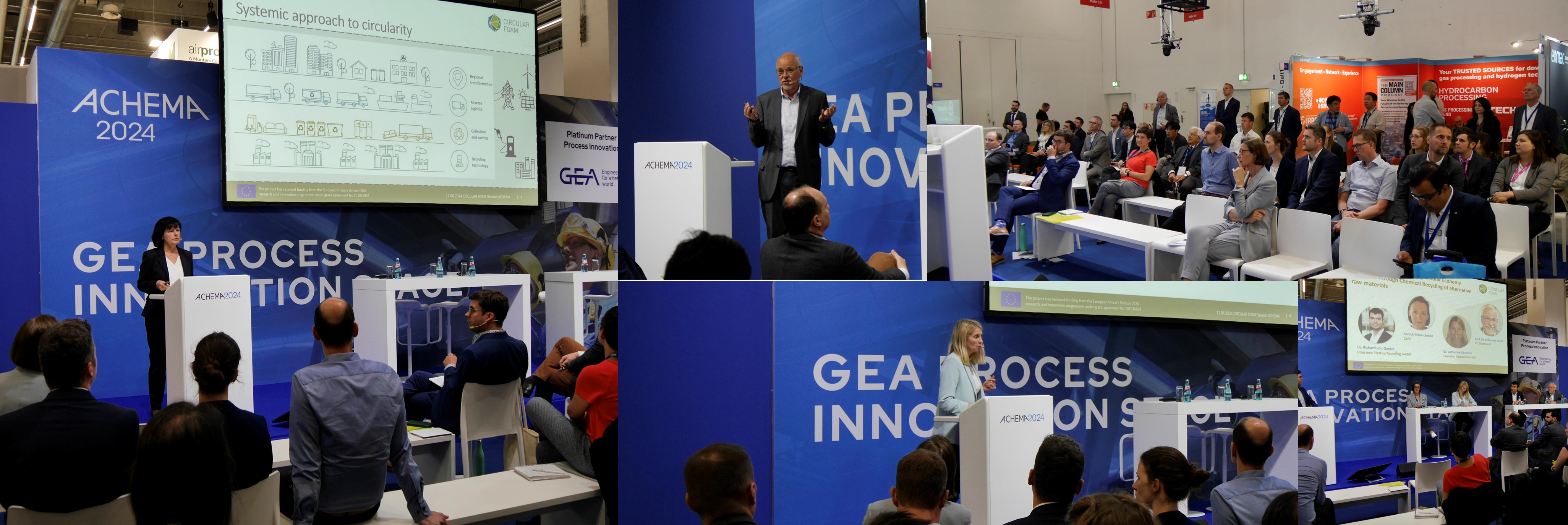Solutions to close the cycle on rigid foams - CIRCULAR FOAM presents the latest results at ACHEMA 2024
The latest developments in chemical recycling processes for the plastics industry were discussed in a series of stage contributions at ACHEMA 2024, the world’s leading trade show for the process industries. The Horizon 2020 project CIRCULAR FOAM, which is demonstrating all technological and non-technological steps required to achieve circularity of rigid polyurethane foams used as insulation in refrigerators and construction, was present with a dedicated stage session featuring the latest project updates and an expert panel discussion.
Dorota Pawlucka and Dr Catherine Lövenich from Covestro, one of the world’s leading manufacturers of polymer materials, as well as Prof Sebastian Engell from TU Dortmund shared insights on the CIRCULAR FOAM project, highlighting the importance of building full value chains and systemic circular solutions including recycling technology, waste collection and sorting steps for rigid polyurethane foams. The presentations were followed by a panel discussion, featuring the speakers, Annick Meerschman from Cefic and Dr Richard von Götze from Interzero, one of the leading environmental service providers.
In the project, rigid polyurethane foams used in refrigerators are chemically treated with two alternative chemical recycling technologies: chemolysis and catalytic/smart pyrolysis. The future supply chain starts with the collection and dismantling of end-of-life products, followed by the fine sorting and chemical recycling of the materials and downstream purification processes. The aim is to produce new polyurethane insulations in which recycled raw materials can replace the fossil-based materials.
The central idea of the project is to develop iteratively all steps necessary for the implementation of the fully circular system for polyurethane rigid foams and explore scenarios that would make the whole systemic solution economically viable for all contributors, said Dorota Pawlucka. This means that the players of the value chain align on their developments focussing on the rigid polyurethane foams in the specific applications. This approach is expected to help kickstart the implementation of solutions as soon as the technologies are ready. For example, specific waste streams are required for the chemical recycling processes being developed in the project; thus, collection and sorting processes must be sufficiently accurate to provide them. Besides the quality requirements the input materials are facing, the provision of the input materials in sufficient and reliable amounts is equally important.
In her presentation, Dr Catherine Lövenich spoke about the specific challenges of the two main recycling routes but closed by emphasizing that despite the remaining technical challenges, polyurethane rigid foams are indeed recyclable, and that there are chemical recycling technologies out there which make it possible to do this.
Prof Engell explained that currently, polyurethane foams are most often incinerated. Collection systems for refrigerators exist but are not economically motivated by intentions for plastic recycling. For construction materials, a legal obligation for a separate collection of insulation boards and metal sandwich panels could greatly enhance the business case for the collective endeavour of rigid polyurethane recycling. Overall, the set-up of such a system requires well thought-out collaboration practices and a coordinated interplay between mechanical sorting and preparation steps and the chemical recycling technologies best suited for the system.
The project "CIRCULAR FOAM - Systemic expansion of territorial CIRCULAR Ecosystems for end-of-life FOAM" develops and demonstrates all technological steps required to achieve circularity of plastics in post-consumer applications, using the example of rigid polyurethane foams used as insulation in refrigerators and construction.
The CIRCULAR FOAM consortium is composed of all actors required to close the circular value chain (process industries, manufacturing, waste management, technology providers, incl. research partners, logistics, social scientists and economists working with the public sector, and citizens).
back to overview
© DECHEMA e.V. 1995-2025, Last update 17.01.2025

